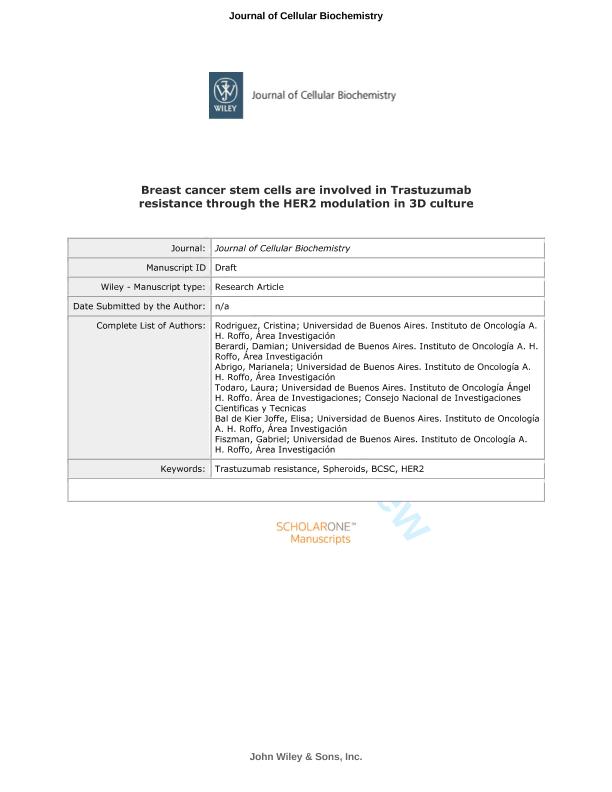Artículo
Breast cancer stem cells are involved in Trastuzumab resistance through the HER2 modulation in 3D culture
Rodríguez, Cristina Elisa ; Berardi, Damian Emilio
; Berardi, Damian Emilio ; Abrigo, Marianela; Todaro, Laura Beatriz
; Abrigo, Marianela; Todaro, Laura Beatriz ; Bal, Elisa Dora
; Bal, Elisa Dora ; Fiszman, Gabriel Leon
; Fiszman, Gabriel Leon
 ; Berardi, Damian Emilio
; Berardi, Damian Emilio ; Abrigo, Marianela; Todaro, Laura Beatriz
; Abrigo, Marianela; Todaro, Laura Beatriz ; Bal, Elisa Dora
; Bal, Elisa Dora ; Fiszman, Gabriel Leon
; Fiszman, Gabriel Leon
Fecha de publicación:
02/2018
Editorial:
Wiley-liss, Div John Wiley & Sons Inc
Revista:
Journal of Cellular Biochemistry
ISSN:
0730-2312
Idioma:
Inglés
Tipo de recurso:
Artículo publicado
Clasificación temática:
Resumen
Breast cancer human cells culture as spheroids develop autophagy and apoptosis, which promotes Trastuzumab resistance in HER2 overexpressing cells. Our aim was to study the association of the hostile environment developed in 3D with the breast cancer stem cells population and the HER2 modulation.Human mammary adenocarcinoma cell lines were cultured as spheroids using the hanging drop method. We generated hypoxia conditions by using a hypoxic chamber and CoCl2 treatment. Breast cancer stem cells were measured with mammosphere assays, the analysis of CD44+CD24low population by flow cytometry and the pluripotent gene expression by RT-qPCR. HER2 expression was evaluated by flow cytometry and Western blot. MTS assays were conducted to study cell viability.Hostil environment developed in spheroids, defined by hypoxia and autophagy, modulated the response to Trastuzumab. In HER2+ cells with acquired resistance, we observed an increase in the breast cancer stem cell population. In BT474 spheroids, Trastuzumab induced the acquisition of resistance, along with an increase in breast cancer stem cells. Also, in 3D culture conditions we determined a modulation in the HER2 expression.Moreover, breast cancer stem cells showed enhanced HER2 expression. Finally, cells without HER2 gene amplification cultured as spheroids were sensitive to Trastuzumab, diminishing HER2 expression and cancer stem cells.Our findings show that 3D architecture is able to modulate breast cancer stem cell population and HER2 distribution, modifying the cell response to Trastuzumab.
Palabras clave:
Breast Cancer
,
Trastuzumab Resistance
,
Cancer Stem Cells
,
3d Cultures
Archivos asociados
Licencia
Identificadores
Colecciones
Articulos(OCA HOUSSAY)
Articulos de OFICINA DE COORDINACION ADMINISTRATIVA HOUSSAY
Articulos de OFICINA DE COORDINACION ADMINISTRATIVA HOUSSAY
Citación
Rodríguez, Cristina Elisa; Berardi, Damian Emilio; Abrigo, Marianela; Todaro, Laura Beatriz; Bal, Elisa Dora; et al.; Breast cancer stem cells are involved in Trastuzumab resistance through the HER2 modulation in 3D culture; Wiley-liss, Div John Wiley & Sons Inc; Journal of Cellular Biochemistry; 119; 2; 2-2018; 1381-1391
Compartir
Altmétricas



